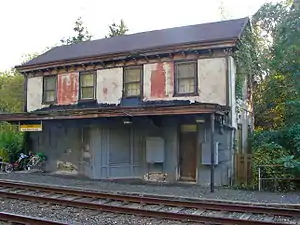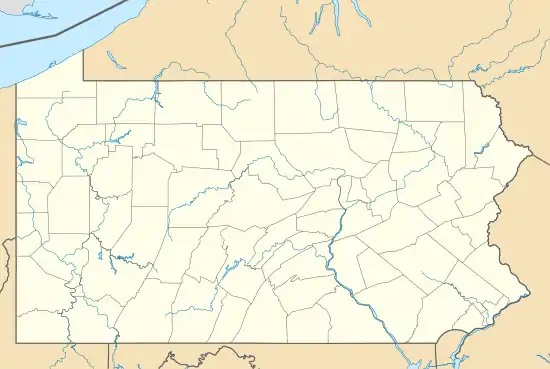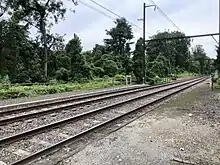Shawmont station
Shawmont is a former train station in Philadelphia, Pennsylvania. It is located on Nixon Lane in the Roxborough section of Lower Northwest Philadelphia. Built by the Philadelphia, Germantown and Norristown Railroad, it later became part of the Reading Railroad and ultimately SEPTA Regional Rail's R6 Norristown Line. SEPTA made the station a whistle stop and closed its waiting room in 1991.[3] SEPTA later closed the station in 1996.[4] In 2018, $1 million was set aside for repairs and rehabilitation.
Shawmont | |||||||||||||||||||||||
|---|---|---|---|---|---|---|---|---|---|---|---|---|---|---|---|---|---|---|---|---|---|---|---|
| Former train station | |||||||||||||||||||||||
 The former Shawmont Reading station in 2010 | |||||||||||||||||||||||
| Location | 7800 Nixon Lane Roxborough, Philadelphia, Pennsylvania | ||||||||||||||||||||||
| Owned by | SEPTA | ||||||||||||||||||||||
| Line(s) | Norristown Line | ||||||||||||||||||||||
| Platforms | 1 side platform | ||||||||||||||||||||||
| Tracks | 2 | ||||||||||||||||||||||
| Construction | |||||||||||||||||||||||
| Platform levels | 1 | ||||||||||||||||||||||
| History | |||||||||||||||||||||||
| Opened | 1834 (PG&N) | ||||||||||||||||||||||
| Closed | 1996 | ||||||||||||||||||||||
| Electrified | February 5, 1933[1] | ||||||||||||||||||||||
| |||||||||||||||||||||||
Shawmont Train Station, Philadelphia and Reading Railroad | |||||||||||||||||||||||
 | |||||||||||||||||||||||
| Coordinates | 40°2′38″N 75°15′0″W | ||||||||||||||||||||||
| Part of | Upper Roxborough Historic District (ID01000463[2]) | ||||||||||||||||||||||
| Added to NRHP | July 21, 1995 | ||||||||||||||||||||||
History
The first railroad in Philadelphia opened on June 7, 1832: the Philadelphia, Germantown and Norristown Railroad, running from downtown to Germantown (now on SEPTA's Chestnut Hill East Line). Two years later, the PG&N built a line to Norristown, including the Shawmont station, which is believed to have been designed by renowned architect William Strickland.[5] On December 1, 1870, the PG&N was leased by the Philadelphia and Reading Railway (later the Reading Company).
By 1884, the Pennsylvania Railroad had joined the competition with the Schuylkill Branch, a line that ran parallel to the Norristown line with a Shawmont station of its own. The Pennsylvania electrified its line in 1930, the Reading the following year.

Railroad service declined after World War II, and the Pennsylvania Railroad closed its Shawmont station on October 30, 1960,[6] terminating all passenger service north of Manayunk. The Southeast Pennsylvania Transportation Authority began arranging new contracts with the PRR and RDG to continue commuter rail services in the Philadelphia region in 1966. In 1968, the Pennsylvania merged with their much larger rival, the New York Central Railroad to form the Penn Central Railroad. Penn Central filed for bankruptcy on June 21, 1970, which, adjusted for today’s dollars, is still the largest bankruptcy filing in US history. In 1971, the Reading filed for bankruptcy. In 1976, the Reading and Penn Central were acquired by Conrail, which provided commuter rail services under contract to SEPTA until January 1, 1983, when SEPTA assumed operations. Two years before this took place, SEPTA ended diesel service to Reading and Pottsville.[7]
Shawmont station became a contributing property of the Upper Roxborough Historic District in 1995, but was closed by SEPTA in 1996.[8] The last of the Brendel’s descendants, move out of Shawmont Station, after occupying the Station for 104 years.[9]
In 2009, the building was added to the Philadelphia Register of Historic Places, preserving it from potential destruction.[10]
In 2018, the Delaware Valley Regional Planning Commission gave $1 million to rehabilitate the former station.[10]
References
- "New Electric Schedule". The Scranton Times. February 4, 1933. p. 12. Retrieved August 21, 2020 – via Newspapers.com.

- "National Register Information System". National Register of Historic Places. National Park Service. July 9, 2010.
- {cite web|https://hiddencityphila.org/2013/12/endangered-manayunks-historic-shawmont-station/
- "PRR to Stop Service at Norristown Oct. 31". The Philadelphia Inquirer. October 18, 1960. p. 35. Retrieved October 9, 2020 – via Newspapers.com.

- Dougherty, Frank (October 25, 1996). "Septa Board Cuts Service But Opposition Is Spirited". Philadelphia Daily News. Retrieved August 14, 2016.
- "Historic Shawmont Train Station to be restored with $1M boost". Curbed Philly. Retrieved 2018-01-30.